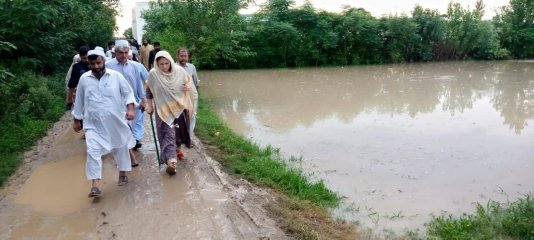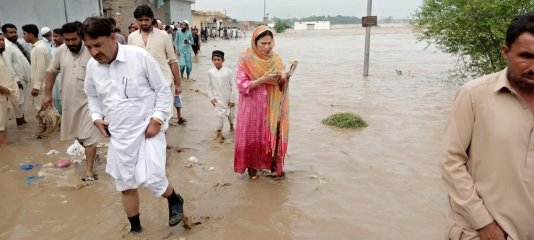- About
- Topics
- Picks
- Audio
- Story
- In-Depth
- Opinion
- News
- Donate
- Signup for our newsletterOur Editors' Best Picks.Send
Read, Debate: Engage.
| September 29, 2022 | |
|---|---|
| topic: | Natural disaster |
| tags: | #Pakistan, #floods, #climate change, #climate action |
| located: | Pakistan |
| by: | Shadi Khan Saif |
As much of the country remains covered in flood-water, questions arise about what could have been done to minimise the damage sustained by thousands of Pakistanis in small towns and villages.
Speaking to FairPlanet from Sindh Province - the country’s worst-affected, Amar Guriro, an environmental journalist, said that many lives and assets could have been saved had basic lessons been learnt from similarly disastrous floods that took place several years ago.
"In the Badin district of Sindh province alone [...] high water remained stranded for weeks after the flood water arrived here, and a similar situation was on display further south, where land-grabbing and encroachment made it impossible for the water to [flow] through to the sea," said Guriro, who has been covering the region for nearly two decades.
He further mentioned that rampant commercial and urban development on the outskirts of Pakistan’s largest city, Karachi - located in Sindh Province, are among the contributors to the scale of devastation.
While Pakistan’s economy has remained in shambles for years, the construction sector has continued to enjoy consistent growth thanks to the many incentives extended by the government.
"There are construction projects developed on the natural path of flood water and streams," said Guriro.
The UN and Pakistani government launched a joint appeal for $160 million last month to address the pressing need for rescue operations as floods swept through the country, engulfing two-thirds of it.
But while the appeal received positive and timely responses from the international community and humanitarian sector, the tale of devastation does not end there. Now, the situation enters the relief and rehabilitation phase for millions of men, women and children uprooted by the floods; people who are highly vulnerable to diseases and malnutrition.
Reports are now revealing criminal negligence and misappropriation of rescue funds by the authorities. For instance, a Tweet by Guriro provides evidence indicating that the Sindh government has begun procuring expensive vehicles with resources allocated for flood victims.
Former government adviser and economic affairs expert Qaisar Bengali told FairPlanet that it has become the norm in Pakistan to "forget" about natural disasters such as this one until another one hits.
"The flood water could have been trained, which is a technical term meaning the flood water could have been smartly diverted through canals to avoid damage in populated areas and farmlands," Bengali said. "But in Pakistan, everybody forgot about it after the previous floods, and it is possible that we would stop talking about it in few months time until the next floods."
As a top priority, land regulations must be taken seriously alongside other governance measures to prevent the loss of life and property in the future, said Quratulain Wazir, a local official in Pakistan's Khyber Pakhthunkhwa Province. Wazir is hailed as national hero for her rescue and relief efforts.
"We faced a lot of resistance and even legal hurdles to clear flood paths and encroachments on flood paths and sewerage lines," she told FairPlanet. "It is a serious issue that needs to be resolved."
Pakistan has been bearing the brunt of the climate crisis despite contributing very little to it. The annual mean temperature in the country has gone up at least by 0.5°C and the number of heat wave days per year has increased nearly fivefold in the last three decades.
It is feared that the annual mean temperature in Pakistan would further rise by 3°C to 5°C.
Reports also indicate that the sea level along the Karachi coast - where flood water flows from the north to the south of the country - has risen approximately by 10 centimeters. The sea level is expected to rise by a further 60 centimeters by the end of the century.
This will most likely affect the low-lying coastal areas south of Karachi, which are already devastated by recurring floods and their aftermaths. The death toll from the most recent floods continues to rise, with the authorities confirming nearly 1,500 casualties and thousands more injured.
Commenting on this, Aftab Alam Khan, a Pakistan-based international consultant on climate change policies, told FairPlanet that the 2022 floods have caused devastation for nearly 50 million people in the country.
Underlining the global factors behind it, Khan stressed that Pakistan, as one of the most heavily affected countries, should have developed climate adaptation policies and programs across the country.
"For example, despite historic floods in 2010, we took nine years to develop and approve the National Floods Protection Plan (NFPP) by 2019, and before its implementation we are devastated by far greater floods in 2022," Khan said.
"Moreover, we could not stop reconstruction of houses and hotels on the riverbed regardless of destruction caused by 2010 floods," he added. "Post 2022-floods rehabilitation and rebuilding plans should be developed based on climate adaptation strategies."
Image by IRIN Photos.
By copying the embed code below, you agree to adhere to our republishing guidelines.


